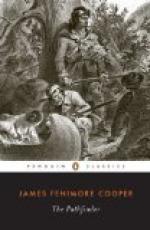June paused, for she had been in earnest in her intention to depart; and then she said quietly, “Bring June pigeon.”
“A pigeon! Where shall I find a pigeon to bring you?”
“Next hut; bring old one; June go to canoe.”
“I think I understand you, June; but had I not better lead you back to the bushes, lest you meet some of the men?”
“Go out first; count men, one, two, t’ree, four, five, six” — here June held up her fingers, and laughed — “all out of the way — good; all but one, call him one side. Then sing, and fetch pigeon.”
Mabel smiled at the readiness and ingenuity of the girl, and prepared to execute her requests. At the door, however, she stopped, and looked back entreatingly at the Indian woman. “Is there no hope of your telling me more, June?” she said.
“Know all now, blockhouse good, pigeon tell, Arrowhead kill.”
The last words sufficed; for Mabel could not urge further communications, when her companion herself told her that the penalty of her revelations might be death by the hand of her husband. Throwing open the door, she made a sign of adieu to June, and went out of the hut. Mabel resorted to the simple expedient of the young Indian girl to ascertain the situation of the different individuals on the island. Instead of looking about her with the intention of recognizing faces and dresses, she merely counted them; and found that three still remained at the fire, while two had gone to the boat, one of whom was Mr. Muir. The sixth man was her uncle; and he was coolly arranging some fishing-tackle at no great distance from the fire. The woman was just entering her own hut; and this accounted for the whole party. Mabel now, affecting to have dropped something, returned nearly to the hut she had left, warbling an air, stooped as if to pick up some object from the ground, and hurried towards the hut June had mentioned. This was a dilapidated structure, and it had been converted by the soldiers of the last detachment into a sort of storehouse for their live stock. Among other things, it contained a few dozen pigeons, which were regaling on a pile of wheat that had been brought off from one of the farms plundered on the Canada shore. Mabel had not much difficulty in catching one of these pigeons, although they fluttered and flew about the hut with a noise like that of drums; and, concealing it in her dress, she stole back towards her own hut with the prize. It was empty; and, without doing more than cast a glance in at the door, the eager girl hurried down to the shore. She had no difficulty in escaping observation, for the trees and bushes made a complete cover to her person. At the canoe she found June, who took the pigeon, placed it in a basket of her own manufacturing, and, repeating the words, “blockhouse good,” she glided out of the bushes and across the narrow passage, as noiselessly as she had come. Mabel waited some time to catch a signal of leave-taking or amity after her friend had landed, but none was given. The adjacent islands, without exception, were as quiet as if no one had ever disturbed the sublime repose of nature, and nowhere could any sign or symptom be discovered, as Mabel then thought, that might denote the proximity of the sort of danger of which June had given notice.




